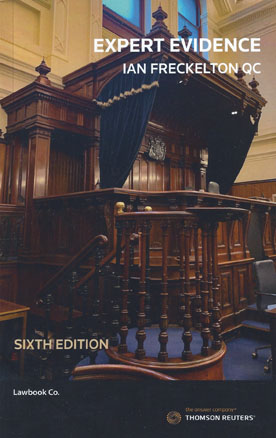
Expert Evidence: Law, Practice, Procedure and Advocacy now in its Sixth Edition, is the acclaimed work of first resort for analysing the complex law and practice surrounding expert witnesses and expert evidence in personal injury, commercial, criminal and family law litigation.
It has been cited for over two decades by superior courts in every jurisdiction in Australia and New Zealand, as well as in a number of other countries. The sixth edition consolidates Expert Evidence as the leading international work on its subject, with additional treatment of the law in common law jurisdictions.
Expert Evidence analyses the common law and statutory criteria for expert evidence admissibility and provides advocacy guidance in relation to how best expert witnesses can be assisted to provide their opinions to courts and be made accountable for them.
It discusses the optimal ways for concurrent evidence (hot-tubbing) and experts‘ meetings prior to court hearings (expert conclaves) to be managed. It reviews decisions in relation to the disciplinary and civil liability of expert witnesses, and the potential for wasted costs orders to be made against experts, as well as the lawyers who commission them.
It analyses the role of assessors, referees and court-appointed experts, as well as the forensic consequences of courts’ codes of conduct for experts, including when breaches of such codes may have to adverse consequences. It also reviews trends in appellate case law in relation to trial judges’ decisions to admit and decline to admit expert opinions.
Expert Evidence also deals with a range of areas of specialist knowledge where admissibility and reliability issues have been confronted in relation to expert opinions, including in relation to novel medical and scientific evidence, as well as counter-intuitive opinions from mental health professionals. Chapters are devoted to accounting, engineering, statistical, anthropological, survey, and planning evidence, as well as in relation to expert evidence about foreign law.
Reflecting the law as at 1 July 2019, the Sixth Edition:-